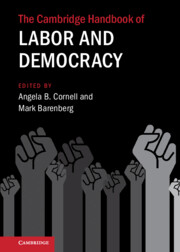Book contents
- The Cambridge Handbook of Labor and Democracy
- The Cambridge Handbook of Labor and Democracy
- Copyright page
- Contents
- Contributors
- Acknowledgments
- Introduction
- Part I Labor and Democracy: Theory and Practice
- 1 A New Labor Law for Deep Democracy
- 2 Labor and Democracy
- 3 Labor’s Obstacles and Democracy’s Demise
- 4 Right-Wing Populism, Illiberal Democracy, Trade Unions, and Workers’ Rights
- Part II History, Politics, and Law
- Part III Labor, Diversity, and Democracy
- Part IV Country and Regional Perspectives
- Part V Labor and Democracy Sectoral Case Studies: Platform Workers, Higher Education, and the Care Industry
- Index
- References
2 - Labor and Democracy
Constructing, Deepening, and Defending Citizenship Rights
from Part I - Labor and Democracy: Theory and Practice
Published online by Cambridge University Press: 25 January 2022
- The Cambridge Handbook of Labor and Democracy
- The Cambridge Handbook of Labor and Democracy
- Copyright page
- Contents
- Contributors
- Acknowledgments
- Introduction
- Part I Labor and Democracy: Theory and Practice
- 1 A New Labor Law for Deep Democracy
- 2 Labor and Democracy
- 3 Labor’s Obstacles and Democracy’s Demise
- 4 Right-Wing Populism, Illiberal Democracy, Trade Unions, and Workers’ Rights
- Part II History, Politics, and Law
- Part III Labor, Diversity, and Democracy
- Part IV Country and Regional Perspectives
- Part V Labor and Democracy Sectoral Case Studies: Platform Workers, Higher Education, and the Care Industry
- Index
- References
Summary
Recent patterns of democratic “backsliding” around the world have followed in the wake of a generalized weakening of organized labor under the modern, globalized variant of capitalism. Scholars have long debated whether and how labor contributes to the construction of democratic regimes and the expansion of social citizenship rights, but the current period makes it abundantly clear that democratic advances are always subject to reversal. As such, it is imperative to interrogate labor’s role in the defense of democratic rights and liberties, and not merely the introduction or expansion of those rights.These questions call for a multi-dimensional approach to the study of labor’s relationship to democracy, one that explores labor’s role in (1) constructing democratic regimes, (2) “deepening” democracy by expanding social citizenship rights, and (3) defending democracy against its adversaries and authoritarian currents in society.
- Type
- Chapter
- Information
- The Cambridge Handbook of Labor and Democracy , pp. 36 - 48Publisher: Cambridge University PressPrint publication year: 2022
References
- 1
- Cited by

